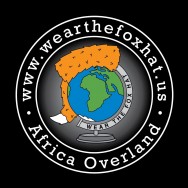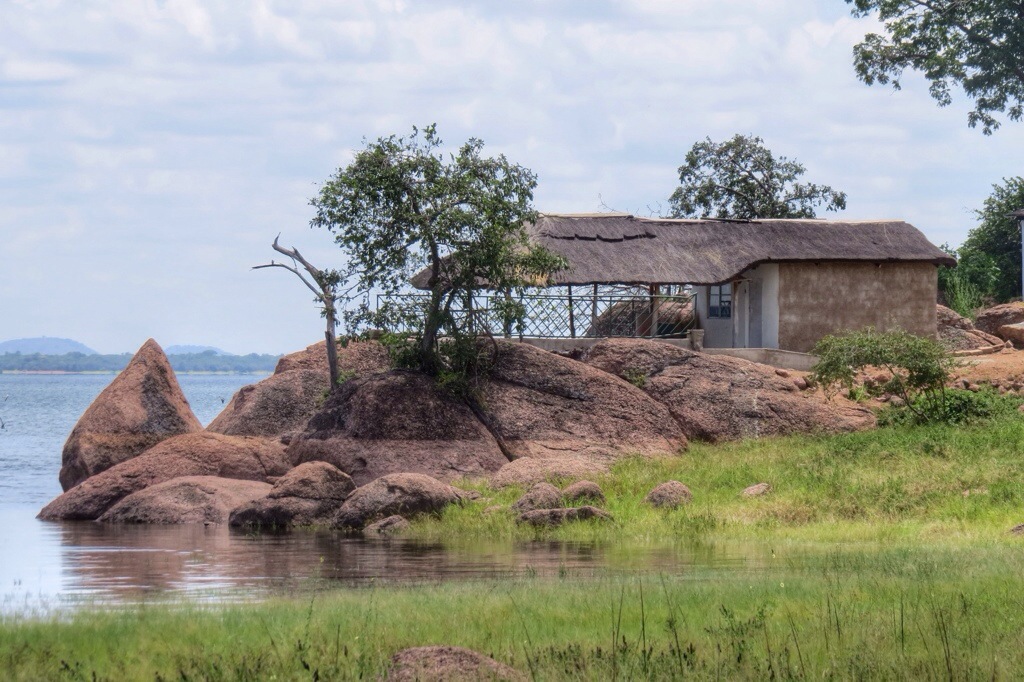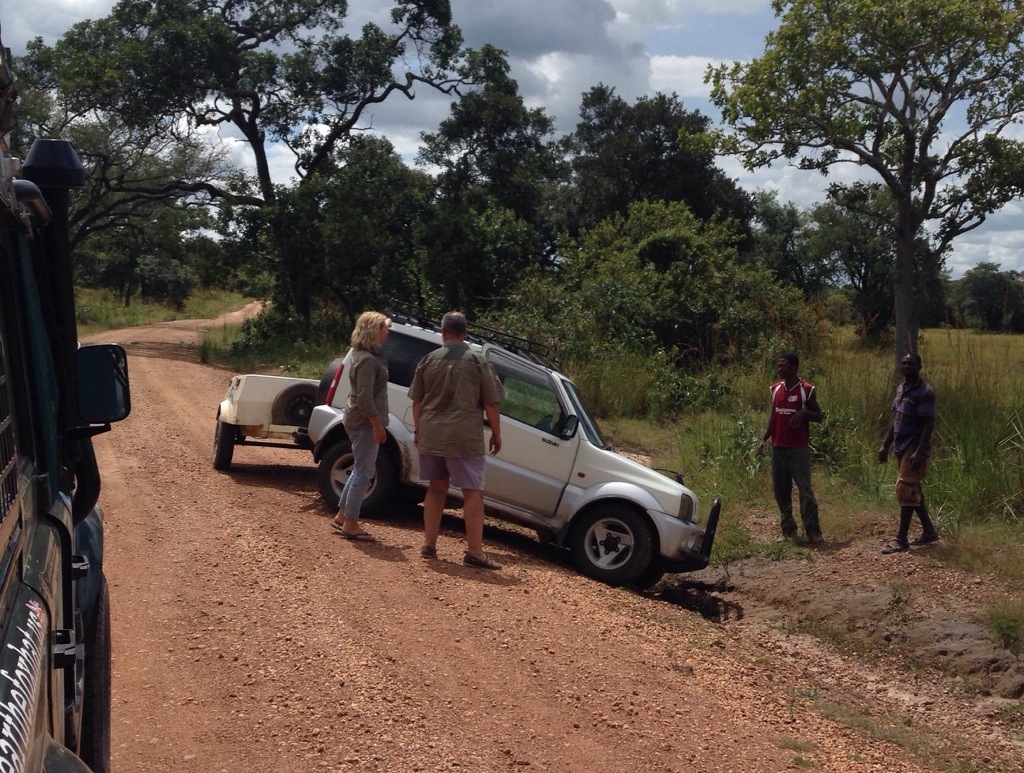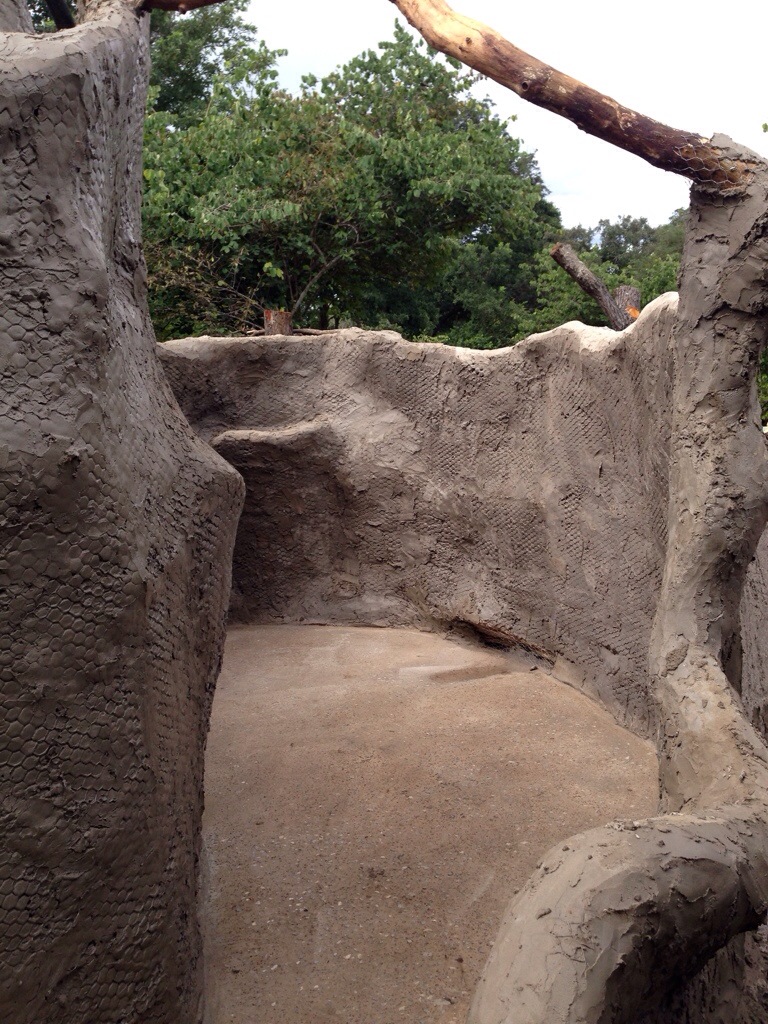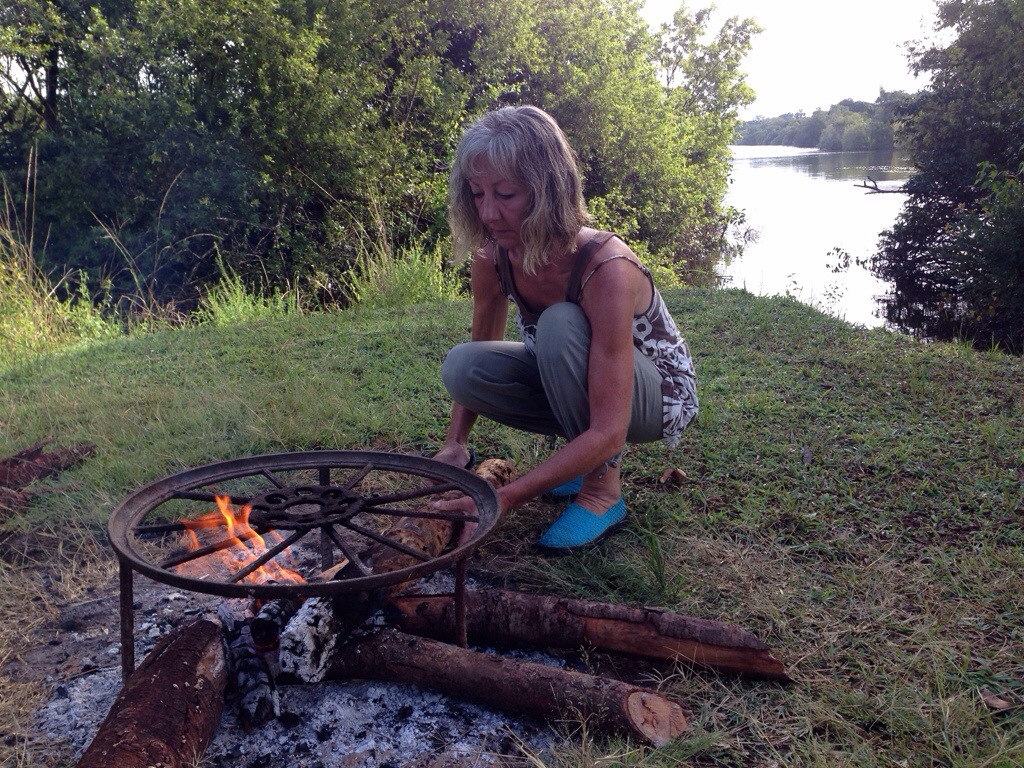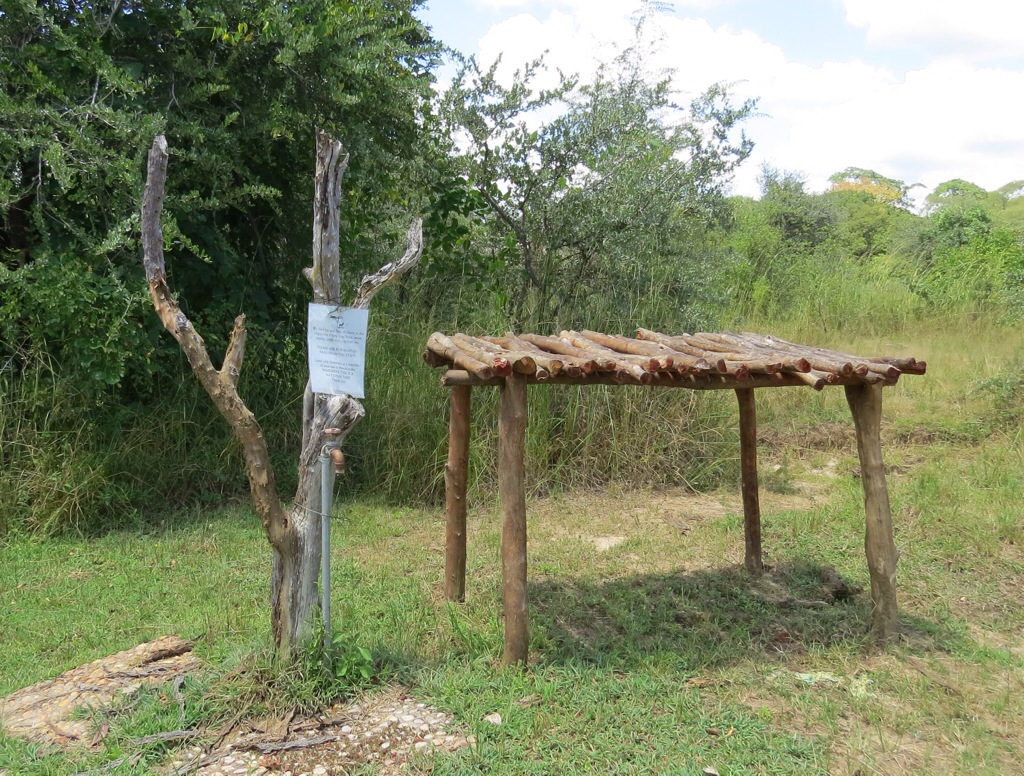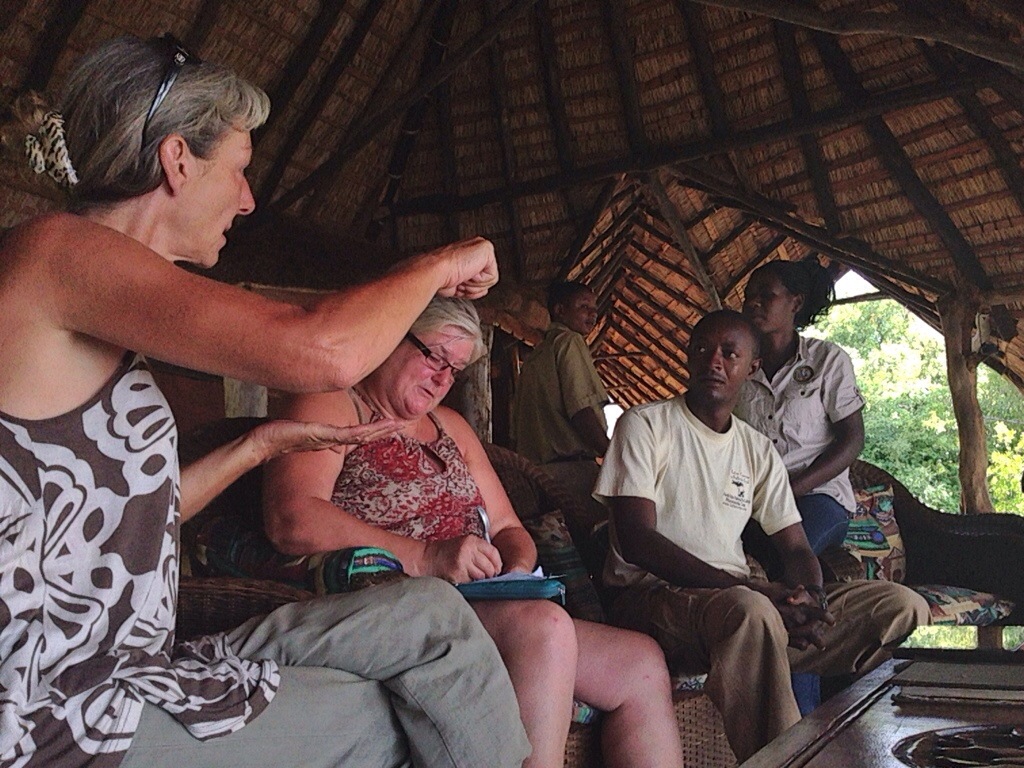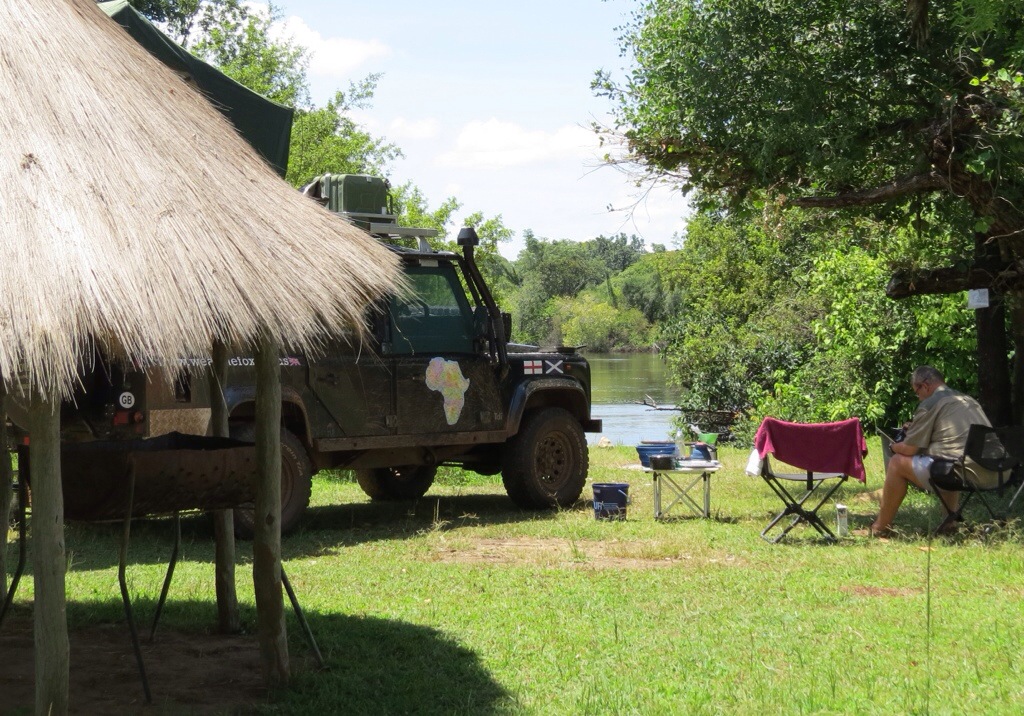From Nanzhilla Plains Camp we had to go back to the Cordon Road as the Plains Road was still boggy & impassable.
The track from here up to the southern end of Lake Ithezi Thezi was easier than it had been from the Dundumwezi Gate. We were hoping to stay at the Shiluwe Hills campsite which is just inside Kafue National Park at the Musa Gate.
The camp has a beautiful ‘lagoon’ style setting, near the new Chinese-built dam which will be used for Hydro-electricity generation.
Unfortunately the camp was closed up so we had no choice other than to leave the park. We looked at a couple of campsites associated with Lodges just outside the Musa Gate – New Kalala was down a steep, appalling track and had no level pitches; Chibilla Camp looked like it just had some chalets amongst the rocks and at Masumgwa the lodge itself was nice but the camping area was just a small patch of grass behind the lodge with no views. Very friendly staff though. Camping 50 kwacha each ($10) so we stayed. Park fees 79 kwacha ($16) each plus 79 kwacha per day fro the car.
Top Tip: Visit the southern end of Lake Itezhi Tezhi. Stay inside the park at Shiluwe Hills – it’s the most beautiful spot on the lake and, although in the park, no park fees are payable while you are camping there.
The local village, Ithezi Thezi is just 1 strip of dusty shops with some tinned goods, onions, potatoes, tomatoes and a fridge of frozen meat. The fuel station (Zesco) is a bit of a novelty. You drive to the top of the hill, tell them how many litres of fuel you want, pay, then drive to the bottom of the hill where the fuel is dispensed. If the tank is filled before you get to the total you paid for, the surplus if forfeit.
The village has a really isolated feel about it as the road from here to Lusaka is 250km of very bad potholes. So bad in fact that, although it was tarred, the best way they could think of to reduce the potholes was to strip off the tar. Doh!!
Fortunately, part of the deal with the Chinese contractor building the dam was that they would re-make the road and tar it again as they leave. Work will start in the next month.
As an alternative, through the park there’s also the new Spinal Road. A gravel road that goes north through Kafue on the west side of the lake and river, that is not on any maps yet. Although it’s narrow, it turned out to be in excellent condition. They have built Irish Bridges for the shallow stream-crossings and 3 new concrete bridges at the northern end for the bigger crossings.
The drive is 4-5 hours from the southern end of Lake Itezhi Tezhi to Hook Bridge (our next destination).
About halfway up the Spinal Road we met Libby.
She’d got wedged when pulling off the road to collect wood for a new campsite her and her husband are building on the West Bank of the Kafue River, about 45km south of Hook Bridge.
We pushed her out, then went and had a look at the campsite under construction. A really nice, riverside spot, which will be developed with an Eco-feel, solar light, ‘bush-style’ showers, etc.
When we exited the park at the M9 we went to look up Sport Beatie who runs the Rapid Response Anti-Poaching Unit in the park and the David Shepherd supported elephant orphanages in both Lusaka and Kafue National Park. Unfortunately he was away at Ngoma filming fire-arms training with 50 of their 80-90 Rangers.
Liz, one of Sport’s colleagues, said there were a couple of camping options at this end of the park so we first tried Mukami Lodge (with a beautiful 2-storey deck, patrolled by Basil their resident hippo) where we had a beer. Unfortunately they stopped doing camping a year ago so we had to carry on another 30km to Myukuyuku Camp.
I’m glad we did. A lovely peaceful spot on the riverside where we camped for a couple of days.
Owned by Pippa, a BA Stewardess who built the place about 15 years ago. Built in a ‘traditional style’.
Very rustic – not sure how most Europeans campers would cope with the kitchen / wash-up facilities, but the place has character.
Camping 100 Kwacha (£10) or $20 per person (plus Park fees 79 Kwacha per day).
Top Tip: Pay in Kwacha withdrawn from ATMs, rather than in US$. Nearly everywhere uses the ‘historic’ exchange rate of 5 Kwacha / $ whereas at present the bank rate is around 6.
We also bumped into Liz again, who was treating herself to a weekend of hot showers away from the bush-camp where the Anti-Poaching unit is set up.
They’re heavily into sustainability and she thinks that the Fuel Briquette programme Helene has been working on with AWU in Uganda could be a real benefit to the local communities here in Zambia. Everyone cuts down trees or uses huge amounts of charcoal for cooking – really bad news.
Below, as we showed them the Fuel Briquette presentation, Helene explains to Loyd (camp manager, seated) and Blessed (an accountant with Zambian Wildlife Authority, ZAWA) how she will snap Liz’s neck and twist her head off if they don’t stop using charcoal.
Both Boyd and Blessed offered us a place to stay if we’d come back and show them how to make briquettes. We’re thinking about how we can make that happen and bringing some samples down from Uganda.
Camping at Myukuyuku next to the Kafue River was great.
The only downside was the vervet monkeys who flash-mobbed our camp. One group raided the bins (distraction tactics) and chased Helene backwards into a ditch. Another stole my box of eggs while I was cooking breakfast on the campfire 6 feet away.
Oh, and one night around 2am a hippo came out of the river next to the car, huffing and grunting, then loudly sprayed dung everywhere for 20 minutes (and I mean sprayed – they use their tails as a whirling fan to ensure it’s spread as far as possible) before belly-flopping back into the water with a huge splash.
Time to move on. East on the quiet, good, tarred M9 to Lusaka. The 280 km took around 5 hours, but that was mainly due to 5 checkpoints on the way. No hassle though, very friendly. The police and officials were more curious than looking for ‘gifts’.
It also took us a while to get through the outskirts of Lusaka. Although there is significant wealth in the city, coming in from the west is just a mass of dusty, congested, sprawling industrial areas. The streets are full of the flashiest and the tattiest vehicles. Every junction is swarming with people selling phone top-up cards, cold drinks, phone chargers, fruit, kids toys, and swimming trunks (!). Not really unlike any other capital city, just closer to the city centre than most.
There’s nowhere to camp in the city centre so we chose Eureka camp, 15km to the south. An oasis of calm, on a game farm.
